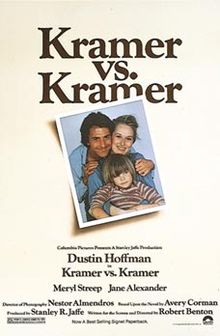The reentrance of the family dramas into mainstream Hollywood cinema was gradual, with such romantic melodramas as The Turning Point in 1977, or Paul Mazursky’s socially relevant comedy An Unmarried Woman in 1978.
But it was Robert Benton’s Kramer Vs. Kramer, the 1979 Best Picture Oscar-winner, which gave legitimacy and definition to the new cycle of family pictures.

The cycle lasted about four years, which is the average duration of a film cycle. During that time, two other films won, Ordinary People and Terms of Endearment, and five others were nominated, Breaking Away, Coal Miner’s Daughter, On Golden Pond, Tender Mercies, and Places in the Heart (also directed by Benton).
Like other films which kicked off new cycles, no one associated with Kramer Vs. Kramer‘s production initially expected such an extraordinary commercial success. Indeed, the film’s carefully designed advertising campaigns, using different posters for different target audiences, prove this point.
Read our review of Ordinary People, Robert Redford’s more sharply observed family melodrama, which won the 1980 Best Picture Oscar
https://emanuellevy.com/wp-admin/post.php?post=97883&action=edit
Nonetheless, based on Avery Corman’s novel, it was a timely film, describing the confusion of many women who wanted to establish a firm identity, independent of their roles as wives and/or mothers.
The film was nicely shot on location, in Manhattan, by Cuban-born cinematographer Nestor Almendros.
But its best asset was its great, prestige cast, headed by Dustin Hoffman and Meryl Streep as the splitting couple, Justin Henry as their son, and Jane Alexander, as their sympathetic neighbor. All four were nominated for their performances, with Hoffman and Streep winning.
The 1979 writing awards were divided between Kramer Vs. Kramer, which won Best Adapted Screenplay, and Breaking Away, Peter Yates’s family comedy set in working class Bloomington, winning the Original Screenplay for Steve Tesitch.
Meryl Streep won a supporting Oscar in the role of Joanna Kramer in Kramer Vs. Kramer, a young woman who walks out on her self-absorbed husband, leaving him the responsibility of raising their 6-year-old son alone.
She is depicted as a confused woman, deeply dissatisfied with her mother-wife chores, but not as a career woman. She has a profession, but her dilemmas are not confined to career frustrations.
First Scene:
There is a close up, in profile, of Joanna Kramer (Meryl Streep), bidding farewell from her son Billy, who is in bed. In the next scene, she is seen packing her suitcase. When she first tells her husband Ted (Hoffman) that she is leaving him, he thinks “it’s a joke.” Taking only $2,000, she heads to the elevator, while he rushes after her. “I’m not good for him, I have no patience, and I don’t love you anymore.” Viewers have seldom heard such an honest and emotionally raw confession from a woman, who’s a young mother. (In most Hollywood movies, it’s the husband-father who is no good for his family, and he is the one to leave–or asked and forced to leave).
Kramer Vs. Kramer was the first major Hollywood movie to deal with a married woman who deserts her family in order “to find herself” and to regain her self-worth. Further, in sharp departure from previous cinematic conventions, she willingly gives up her son, after winning a cruel custody battle, telling her ex-husband: “I came here to take my son home, and I realized he already is home.”
Streep’s Joanna Kramer represented a new screen heroine, a woman who is concerned not only with her career, but also with asserting herself as a worthy human being, a femme whose social status is neither based nor dependent on her marital and familial roles.
The movie also changed the traditional image of the husband-father, played by Dustin Hoffman, who won Best Actor. Ted Kramer starts as a tense, egotistic advertising executive, so engrossed in his career that he neglects his family and forbids his wife to work. But he is capable of changing and, by the film’s end, he is transformed into a loving, caring father who has learned the lessons of parenthood.
Looking back, Kramer Vs. Kramer was too much of a message picture, a soap-opera melodrama, which suggested that a male can be a good parent, too, when under pressure and driven with the right motivation.
Benton’s obvious film is one of the weakest features to have won the Best Picture Award in Oscar’s history.
Oscar Nominations: 9
Picture, produced by Stanley R. Jaffe
Director: Robert Benton
Screenplay (Adapted): Robert Benton
Actor: Dustin Hoffman
Supporting Actress: Meryl Streep
Supporting Actress: Jane Alexander
Supporting Actor: Justin Henry
Cinematography: Nestor Almendros
Film Editing: Jerry Greenberg
Oscar Awards: 5
Picture
Director
Screenplay
Actor
Supporting Actress
Oscar Context:
In 1979, two movies received 9 nominations: “Kramer Vs. Kramer,” which won five Oscars, including Best Picture, and Bob Fosse’s dark musical, “All That Jazz” (a better movie), which received four technical awards.
The other three nominees were Coppola’s Vietnam epic “Apocalypse Now,” the comedy “Breaking Away,” and the socially-conscious drama “Norma Rae,” for which Sally Field received her first Best Actress Oscar.
Credits:
Released by Columbia (Stanley Jaffe Productions)










